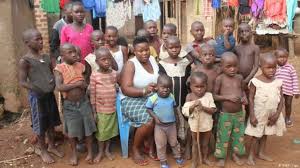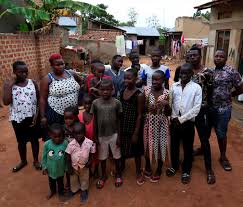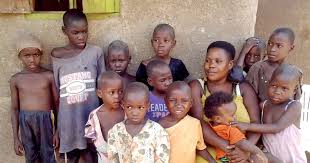
• The world’s most fertile woman has just one wish for her 44 children.
Mariam Nabatanzi, who was just 12 when she married a man almost four times her age, wants her kids to be happy.
She gave birth to her first set of twins by the time she was 13 and then became a mum to quadruplets, triplets and even more twins.
Now, the devoted mother has three sets of quadruplets, four sets of triplets and six sets of twins and others that she raises alone.
Her husband walked out on her in 2016 and the family now struggle with poverty, living in four tiny homes in Uganda.

Now 42, Mariam works tirelessly to make sure she feeds her youngsters, despite suffering from a rare genetic condition.
In order to keep a roof over her families head, Mariam works as a hairdresser, an event decorator and collects and sells scrap metal.
She also brews her own local gin to sell and makes herbal medicine.

Food, medical care, clothes and school fees are all mostly paid for straight out of Mariam’s wages, who desperately wants her children to have all the chances in life that she was denied.
She said: “I have grown up in tears, my man has passed me through a lot of suffering.
“All my time has been spent looking after my children and working to earn some money.”
She has been successful with her older children, with photos of their school graduations hanging proudly on the walls in their home.

But one of her children, Ivan Kibuka, 23, had to drop out of school to help raise the family.
Ivan said: “Mum is overwhelmed, the work is crushing her, we help where we can, like in cooking and washing, but she still carries the whole burden for the family. I feel for her.”
The tough living conditions are evident in cement brick buildings, sheltered only by corrugated iron roofs.
The settlement is surrounded by coffee fields and Mariam and her mini-clan share just four tiny homes between them.
Twelve of the children sleep in metal bunk beds while the others either share mattresses on the floor or sleep in the dirt.
There simply isn’t enough space for all 44 of them.
But, no matter how young, Mariam insists that the children learn to pitch in together and help with the chores.
The family gets through 25kgs of maize flour every day to make sure they have enough to eat – but meat and fish are rare treats.
Mariam also has a rota of cooking and washing duties, and a message on a board in the kitchen that reads: “on Saturday, we all work together”.
Mariam grew up wanting six children after her own childhood was filled with tragedy.
Her mum walked out on her, her dad and her five siblings – and when her father remarried, Mariam’s stepmother poisoned her solder siblings.
She mixed cut glass into their food, a heartless act which Mariam only survived because she was visiting a relative.
Later, Mariam only discovered what had happened after family members told her.
She said: “I was seven years old then, too young to even understand what death actually meant.”
As a result, Mariam wanted nothing more than a family of her own.
At age 12, she married her then 40-year-old husband and gave birth to their first set of twins soon after.
Following their birth, Mariam went to a doctor who told her she had unusually large ovaries and advised her against birth control.
He told her that the pill might cause health problems, so the children just coming.
While it’s true that having a large family in Uganda is considered normal, Mariam’s family is still considered to be enormous.
On average, women will have 5.6 children (yeah, work that one out) and by the time she was 23 Mariam was begging her doctor to stop her from having any more kids.
By this point, she’d already had 25.
It wasn’t until Mariam fell pregnant with twins for the final time that she got the help she needed.
Sadly, one of her twins died during labour, and Mariam’s husband abandoned both her and the children.
But, at long last, medics took action to stop her becoming pregnant again.
Dr Charles Kiggundu, a gynecologist at Mulago Hospital in Kampala, Uganda, said: “Her case is genetic predisposition to hyper-ovulate, which is releasing multiple eggs in one cycle, which significantly increases the chance of having multiples; it is always genetic.”
She added that her doctor told her he had “cut my uterus from inside”.
But Mariam has just one heartbreaking wish for her children – for them to be happy.
She said: “I started taking on adult responsibilities at an early stage. I have not had joy, I think, since I was born.”





